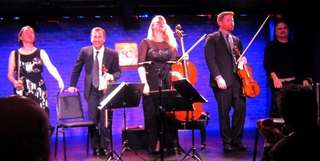|
Back
Works In Progress New York
SubCulture, 45 Bleecker Street
04/01/2014 -
“92Y Concerts at SubCulture”
Antonín Dvorák: Cypresses, B. 152 No. 12, 3, 7 & 11
George Tsontakis: String Quartet No. 6 (NY premiere)
Franz Schubert: String Quartet No. 15 in G Major, D. 887
Cypress String Quartet: Cecily Ward, Tom Stone (Violins), Ethan Filner (Viola), Jennifer Kloetzel (Cello)

C. Ward, T. Stone, E. Filner, J. Kloetzel, G. Tsontakis
(© Coco T. Dog)
Eponymoustically speaking, the Cypress String Quartet came into New York on just the right day. True, we don’t have real cypresses, as in Cypress’s native California. But the amiable ensemble ventured to the SubCulture Underground on a day when our trees tentatively sprouted leaves, sweaters were cautiously doffed, and provisional half-smiles hoped for a conditional Spring.
Adding to their eponymous welcome to Spring, the Cypress String Ensemble started with four excerpts from the music which gave them their name, Antonin Dvorák’s Cypresses, a rare work which wasn’t published complete until 1957. The bagatelles are pretty enough, but hardly give insight into what a string quartet can do, since they are more solo songs (their original inspiration). But they certainly sufficed for this string quartet.
One had little inkling of the Cypress String Quartet depths, since each of these four were led by the glowing Stradivarius of Cecily Ward, the other string players giving mere accompaniment. She was the lead in the final Cypress (the first played here), but violist Ethan Filner added much to the song. Second violinist Tom Stone added his own sextuplet figure to number 7, but these four works still were showpieces for Ms. Ward...and the young, almost naive Mr. Dvorak.

G. Tsontakis (© Coco T. Dog)
The centerpiece of the evening was the New York premiere of George Tsontakis’s Sixth String Quartet. He is strongly identified with the Cypress, having composed his Fifth Quartet for the group. Yet Mr. Tsontakis has even a stronger relationship with his own brand of contemporary music, which spans many a style and form.
I last heard him with the Albany Symphony Orchestra, where he had been composer-in-residence. He had offered then a suite of old American songs, those “white spirituals” so beloved of Charles Ives, but with his own so-inventive orchestration.
His Sixth Quartet actually had some orchestral color (notably a “squeezebox” imitation, and some sharply beautiful harmonics), but this was primarily a work of the most complex rhythmic, motivic changes for the ensemble as a whole. And Mr. Tsontakis proved again that he is his own man, not part of any “school.”
In a way, this was not a quartet of themes, but of motifs, cells, which transformed themselves with Darwinian evolutions. In Blaze, the second movement (which, as Ms. Ward explained, was in answer to the Fifth Quartet which had no fast movement), Mr Tsontakis started with a 16th-note three-note cell which seemed of scarce importance. But it was repeated constantly throughout the movement. With another composer, this could have been a steadying background to more “inventive” music, but Mr. Tsontakis had an obsession with this minutiae. Yes, he wheezed his group through accordion colors and bits and pieces of cabaret songs, but one was more intrigued with this little three-note worm, and how it wriggled and galloped from one section to another.
The opening Stroph movement enjoyed this same metamorphosis. Ms. Ward started with a theme ending on the highest notes of her Strad, while the other instruments rolled on–literally–with a rolling figure which grew, disintegrated, took on new shapes, and rolled around again.
There was neither program nor orthodox structure in this Sixth Quartet. But if one word could describe the music, that word would be organic. Like amoebae and cypresses and ourselves, the cells changed without our knowing, they mutated, evolved and took on original shapes while somehow remaining, in essence, the same.
The Cypress String Quartet has an equally unique guise in that, after 18 years on the concert circuit, all four members remain youthful and intense. Like all their contemporaries, they constantly expand by commissioning new works. The result is that they are anything but austere, that they take delight in every phrase, and it never becomes simply stolid stalwart playing.
That was true in the final Schubert posthumous G Major Quartet, a work whose emotional complexity put all other works last night into the shade. In fact, more than any Schubert symphony, this is a work of both the greatest joy and the most ardent emotional underpinning.
No string quartet could ever get it right–which makes every performance a new invention. Could even Ms. Ward catch both the sublimity and the serenity of her first movement work? Could the Cypress unify the alarming change of moods in the second movement? Could they actually transcend the sometimes tedious six-eight rhythms of the finale?
They never quite accomplished this. Which should make further performances of this group more intriguing. Like Mr. Tsontakis’ work, and Dvorák’s contant rewriting of his youthful songs, perfection of structure is uninteresting compared to the animate feeling of a work in progress.
Harry Rolnick
|